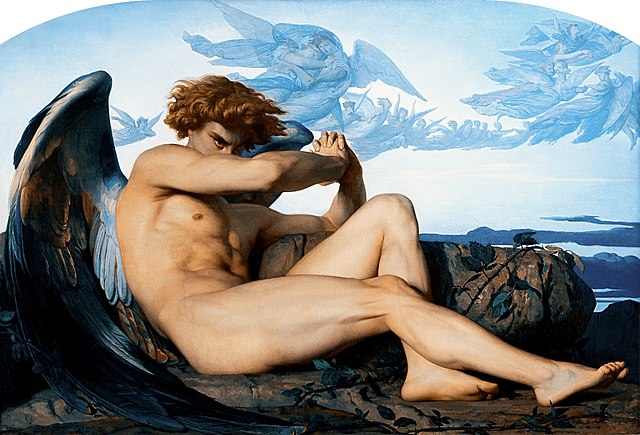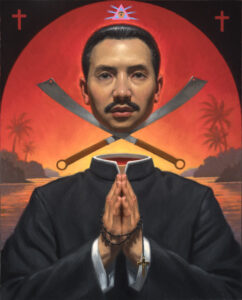Fallen angels, those beings of a higher order than humans who rebelled against their Creator, have captivated storytellers, audiences, and readers alike for thousands of years, yet storytellers have offered radically different takes on these powerful and destructive beings. Stylistic differences are dramatic too. If we are paying attention, “Know thy enemy” is depicted in myriad ways in these 5 books.
I refrain from saying “5 best books” because these are favorites of mine, and books with which I am more familiar. As literature, these books are not intended to be theologically accurate; rather, dramatically depicting the choices, attitudes, and behaviors that turned angels into devils.
“The Iliad”
Attributed to Homer (circa 8th century B.C.)
Few readers of the Iliad see the Greek gods as fallen angels, yet they are a clearly a different order of beings than humans, with powers over nature man doesn’t possess, along with the ability to assume different physical forms. They use humans as pawns in their Great Games and to satisfy their pique and lusts, as depicted by Homer and in many of the Greek myths. In the long war, Aphrodite, Ares, and Zeus support the Trojans, while Hera, Athena, and Poseidon are on the side of Agamemnon and the Greeks. With few exceptions, the Greek gods are egomaniacs to be placated and cajoled by Aegean poleis. In “The Iliad,” thousands of maimed and murdered humans are a small price to pay for the gods’ vanities; interminable intrigues with each other are in keeping with why angels are thought to have fallen from Heaven—pride. Of these 5 books, the gods in “The Iliad” are not intended by the storyteller to be rebellious created beings—fallen angels, yet there is a brief, mysterious passage in the Book of Genesis (6: 2, 4) that reads, “… the sons of heaven saw how beautiful the daughters of man were, and so they took for their wives as many as they chose… At that time the Nephilim appeared on earth (as well as later), after the sons of heaven had intercourse with the daughters of man, who bore them sons. They were the heroes of old, the men of renown.”
“Faust”
By Johann Wolfgang von Goethe (19th century)
Mephistopheles is a slyly sophisticated, parasitic tempter, preying on his “host’s” weaknesses, in young Faust’s case, pride and despair that make him resentful of human fragility: “I am not like a god!/ Too deeply now I feel this truth. I am a worm stuck in the dust/ Burrowing and feeding, where at last I must/ Be crushed and buried by some rambler’s heel.”
In “Faust’s” prologue, Mephistopheles says, “The solar system I must leave unsung/ And to mankind’s woes lend my humble tongue,” hearkening to Satan’s dialogue with God in the beginning of the Book of Job. Mephistopheles’ “humble tongue” convinces Faust to trade a momentary experience of transcendence for an eternity of servitude, then wickedly brings about the wreck of Faust and a young maiden.
“The Lord of The Rings” legendarium
By J.R.R. Tolkien (1920s-1950s)
In Tolkien’s mythology, the most talented of all the elves was Fëanor, who made the gemlike Silmarils that awed and delighted even the Valar (angels). In Tolkien’s legendarium, elves are physical creatures of a lower order than the angelic Valar who have put on physical raiment, as did Gandalf in “The Lord of the Rings.” Tolkien’s Lucifer figure, Melkor, stokes and provokes Fëanor’s pride, sundering elves from the Valar, and from each other, producing a catastrophic centuries-long war. As Rod Serling said, “Some people possess talent, and others are possessed by it. When that happens, a talent is a curse.”
How fallen angels prey on human weakness is masterfully depicted in “The Children of Hurin” when Tolkien’s Lucifer mixes truth and lies to curse Hurin, his wretched human prisoner: “I am the Eldar King Melkor, first and mightiest of all the Valar, who was before the world, and made it. The shadow of my purpose lies upon Arda, and all that is in it bends slowly and surely to my will. But upon all whom you love my thought shall weigh as a cloud of Doom, and it shall bring them down into darkness and despair. Wherever they go, evil shall arise. Whenever they speak, their words shall bring ill counsel. Whatsoever they do shall turn against them. They shall die without hope, cursing both life and death.” Thus, cascade consequences from Fëanor’s long-ago rebellion and kin-slaying, even unto the elves’ human allies.
“The Screwtape Letters”
By C.S. Lewis (1942)
Writing long before the 21st century Device Age, Tolkien’s brother Inkling, C. S. Lewis’, demon and relentless schemer, Screwtape, says, “We will make the whole universe a noise in the end. We have already made great strides as regards to Earth. The melodies and silences of Heaven will be shouted down in the end. But I admit we are not yet loud enough, or anything like it.” Screwtape’s letters give his junior, Wormwood, advise as to how to separate his “Patient” from God. Rather than appearing in the flesh, Wormwood works from the inside-out, so to speak. Referring to using human avarice against us, Screwtape tells Wormwood, “And all the time the joke is that the word ‘mine’ in its fully possessive sense cannot be uttered by a human being about anything. In the long run, either Our Father (the devil) or the Enemy (God) will say ‘mine’ of each thing that exists, and especially of each man… At present, the Enemy says ‘mine’ of everything on the pedantic, legalistic ground that He made it. Our Father hopes in the end to say ‘mine’ of all things on the more realistic and dynamic ground of conquest.”
“Declare”
By Tim Powers (2000)
In Powers’ meticulously crafted spy novel cum fantasy, fallen angels are djinns, albeit light-years from Disney’s “Aladdin” species. Powers’ djinns are utterly alien, and are manifest, for the most part, as elemental terrors that consume humans: “The urge to surrender to this nearly divine being, this higher order, was overwhelming. To oppose his (Andrew Hale’s) will to this force would simply be to shatter his will, shatter his very reason.” Even so, the djinns’ backstory is traditional of fallen angels in the sense of their rebelling against Heaven, and then establishing lairs in the created world, a prominent refuge being the icy peak of Mount Ararat. Involving hyper-secret offshoots of the Soviet and British spy agencies, to coopt and destroy the djinns respectively, the story spans World War II and the Cold War era. “He (Hale) shivered as he remembered at times cowering before tall sandstorms that boomed out the old rhythmic symbols across the dunes…Never surprise them, he had learned; never reason with them.” Though the form that fallen angels take differs in literature, temptation, lies and half-lies, and terror are their common tactics, all of these assaults conducted by a higher order of beings than man. Therefore, humans, in life as well as literature, cannot hope to resist such beings, whether Goethe’s master trickster, Tolkien’s Dark Lord, or Powers’ elemental behemoth, without Divine assistance. All this while bearing in mind that even to see our own guardian angel without its appearance having been altered to suit our human limitations would probably knock us for a loop at the very least, and this a being with our very best interests in mind.
T. M. Doran is the author of “Toward the Gleam” (Ignatius Press) and the forthcoming novel, “Seeing Red” (Ignatius).




